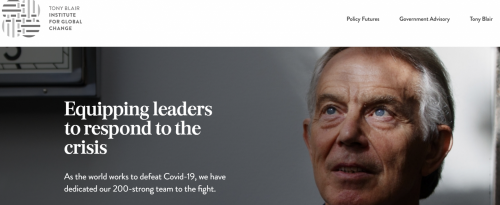
https://institute.global/policy/events?utm_campaign=19578-&utm_medium=em...
Tuesday 19 January, 5-6pm
Post-2020: tech to look forward to
2020 saw an unprecedented acceleration in adoption of tech to fight Covid-19 as well as to help the world adapt to the disruption. What are the trends arising from 2020's acceleration and the things to look forward to in 2021?
Panellists:
- Carly Kind, Director, Ada Lovelace Institute
- Areeq Chowdhury, Technology Policy Researcher
Chair:
Chris Yiu, Executive Director, Technology and Public Policy, Tony Blair Institute for Global Change

Friday 22 January, 2pm
After Brexit: What does the deal mean for future UK-EU relations?
At the eleventh hour, on Christmas Eve, Britain and the EU finally reached agreement on their future relationship. Where does this agreement take future UK-EU relations? Can it provide a sustainable basis for the long term, including for Northern Ireland, or is it simply a short-term fix? What political choices and milestones lie ahead, as this new relationship is forged?
Panellists:
- David Lidington – Chair of the Conservative Group for Europe, Former Conservative MP and Former Minister of State for Europe
- Brigid Laffan - Director of the Robert Schuman Centre for Advanced Studies at the European University Institute
- Charles Grant – Director of the Centre for European Reform
- Anton Spisak - Policy Lead, Trade and Productivity
Chair:
- Ian Mulheirn - Executive Director, UK Policy, Tony Blair Institute

Friday 29 January, 2pm
The State of the Union: Preventing the United Kingdom from coming undone
In 2021, the United Kingdom, newly outside the EU, will come under pressure from centrifugal forces and renewed threats of separatism. The Scottish elections in May appear set to return an enlarged SNP to Holyrood with a new mandate for a second referendum. While the economics of Scottish independence have become even more challenging than they were in 2014, political support for the union on both sides of the border are at a low ebb. What needs to happen in 2021 to avert Scexit? How should we go about rebuilding the identity of, and sense of belonging to, the United Kingdom?
Panellists:
- Ruth Davidson, MSP and Former Leader of the Scottish and Conservative Party
- Ian Murray, Shadow Secretary of State for Scotland
- Alex Massie, Scotland Editor for The Spectator
Chair:
- Ian Mulheirn, Executive Director, UK Policy, Tony Blair Institute

Friday 5 February, 10-11 am
What does the UK need to do to make COP26 a success?
What does a successful COP26 look like? For some it will be developing a comprehensive and credible domestic plan to achieve Net Zero in the UK, for others it will be establishing an international coalition and stronger commitments on emissions reduction that get us closer to a 1.5 degree world. Meanwhile for the Conservative party success may be defined by the extent to which the government develops measures that strengthen rather than threaten their broad 2019 electoral coalition. Are these goals mutually exclusive, and if not, what should be the priority?
Panellists:
- Mike Thompson, Chief Economist and Director of Analysis, Committee on Climate Change
- Rachel Wolf, Founding Partner at Public First
- Sir Simon Fraser, Co-Founder of Flint Global, Former Head of the UK Foreign Office and Diplomatic Service
Chair:
- Tim Lord, Senior Fellow, Net Zero, Tony Blair Institute










Add new comment